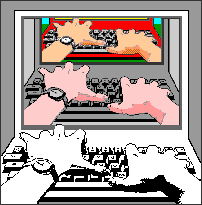CyberPsychology

“This page has links to a number of papers by Hugh Miller and Jill Arnold, of the Department of Social Sciences at Nottingham Trent University, about identity and Web pages.
We’ve also included links to a number of other sites that we’ve found useful and interesting.
We’re keen to make contact with other people who are interested in this area, so feel free to email Hugh or Jill, especially if you’re thinking of linking to this page or to any of our papers: we’d probably like to see your site.
Jill has a questionnaire (and an opportunity to contact her for an interview) about identity and personal home pages.”
This is a site worth having as it identifies something very vital – web pages and identity. Virtual life does not require the paraphernalia of The Matrix, just the Net as we know it.
Later: Friday, 6 June, 2008
The link is now behind a password, but here are some related ones:
Dreamevent
DreamEvents in Psyberspace
Here is the essay i wrote on DreamEvents using the HipBone game.
Ontology of Cyberspace
koepsell (link dead Tuesday, February 22, 2011 but rescued from the archives now here.). (and in Google Drive
David R. Koepsell, The Ontology of Cyberspace: Philosophy, Law, and the Future of Intellectual Property. Chicago and La Salle, Illinois: Open Court, 2000.
Reviewed by Arthur L. Morin
Law is a system of categorization. At the ideal level, one purpose of this system is to help the social system achieve justice. Though not stated so straightforwardly, this is David R. Koepsell’s position in his book The Ontology of Cyberspace: Philosophy, Law, and the Future of Intellectual Property.1 There is, of course, a dynamic interrelation between the legal system of categorization and the socio-cultural system(s) of categorization of which it is a part. Koepsell realizes this, or else he would not have been able to detect the disjunction between what software is and how it has been treated in the legal system. But what he does not seem to fully appreciate is that ontology does not necessarily beget justice. This is the First Problem — the distinction between ontology (what something is) and justice — and I will return to it later.
Books of the Month: August 2001
Books of the Month — Index August 2001
Lev Manovich, The Language of New Media. MIT Press, 2001. Reviewed by Katie Mondloch.
Scott McCloud, Zot!: Hearts and Minds. Published Online. Reviewed by Matt Wolf-Meyer.
Review Essay: William J. Mitchell, City of Bits: Space, Place and the Infobahn (MIT Press, 1996) and William J. Mitchell, e-topia: “Urban Life, Jim — But Not As We Know It” (MIT Press, 1999). Reviewed by Michael Gurstein.
The Hot New Medium Is…
6.04: electrosphere [dead] The Hot New Medium Is … Email
By David S. Bennahum
“List publishing is not merely information delivered to your mailbox, it’s the devolution of mass media into the hands of everyday people. And it’s growing faster than the Web.”
I just found this again! One of my favourite Wired articles ever – still relevant and right.
2010:
found it: here
The Rise and Fall of Wired.
The Rise and Fall of Wired. 6. The Sell-Out. By Stephen Downes [2010 That link is dead but here is a new one.]
” What we were dreaming about was profound global transformation. We wanted to tell the story of the companies, the ideas, and especially the people making the Digital Revolution. Our heroes weren’t politicians and generals or priests and pundits, but those creating and using technology and networks in their professional and private lives – you.”
Also has a list of links to what he calls the GOOD articles in WiReD
Mark Stefik, The Internet Edge: Social, Legal, and Technological Challenges for a Networked World.
Mark Stefik, The Internet Edge: Social, Legal, and Technological Challenges for a Networked World. Cambridge, Massachusetts and London, England: MIT Press, 1999.
Reviewed by Arthur L. Morin [1]
“Mark Stefik works at the Xerox Palo Alto Research Center. He is a “technologist” who creates “new kinds of things” (xvii). He recognizes that “[c]reative times brings many changes” (p. xi). He also recognizes that change in what he calls “Internet time” (ibid.) occurs more rapidly than during earlier times of change. His book, The Internet Edge: Social, Legal, and Technological Challenges for a Networked World, is “about some of the changes taking place in Internet time” (ibid.).”
Content is not King
" What the argument that content is not king does say is that people are willing to pay far more for point-to-point communication than for the famed content. That is likely to be reflected in what kinds of networks are built, and which companies succeed. It inverts the usual ordering of priorities, making point-to-point communication central, and content secondary."
Thanks Christine for the link – a basic and lovely idea – one way we put this notion in a cult I belong to is that "conserved culture" is not as important as "spontaneity".
Internet as Mirror of the Unconscious
Internet and Unconscious: The Psychic Interface by Peter Gomes
“The process of internet use becomes – in part – a dialogue with the Self – the united whole, the complete psychic entity of ourselves both personal, collective, conscious and unconscious – with the internet mirroring the unconscious, working on both a collective and personal level – with use affecting the process of individuation”
An article on the psyche and the net.
Later Sunday, 25 September, 2011
The link above seems not to work.
I’ve found it again – or something similar?) and it is now here too (see below)
